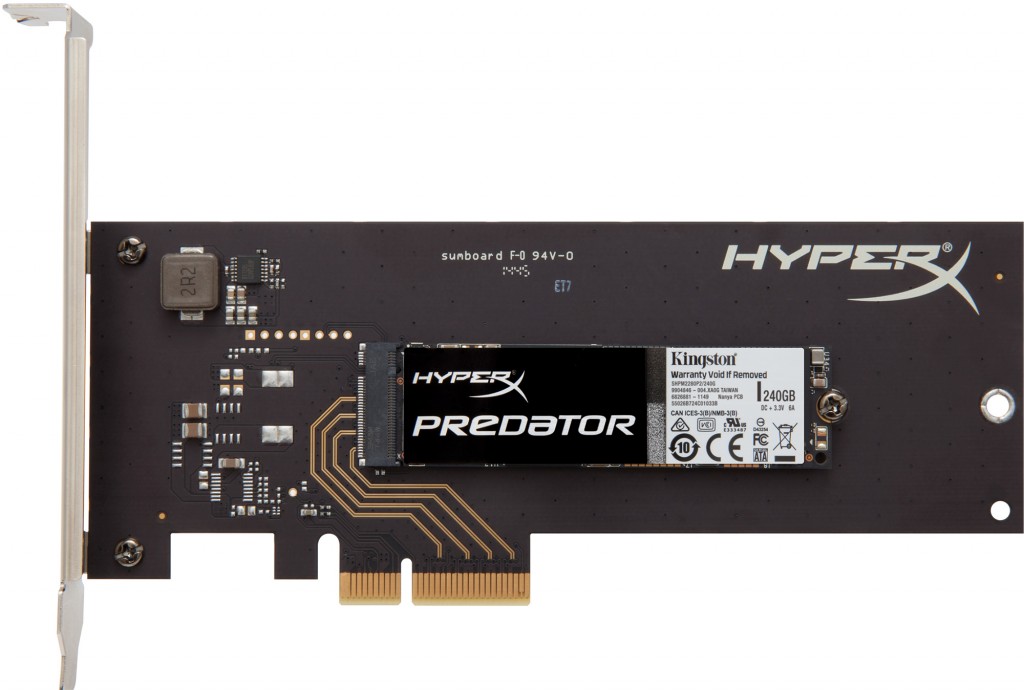Kingston Technology has introduced its first high-performance solid-state drive for consumers that comes with PCI Express 2.0 x4/M.2 interface. The new HyperX Predator SSDs are designed for performance enthusiasts, but thanks to massive simplicity of its construction, it is possible to expect that the product will not be too expensive.
The Kingston HyperX Predator PCIe SSDs will be available in 240GB, 480GB and 960GB capacities. The drives are based on the Marvell 88SS9293 controller and unknown type of NAND flash memory. The manufacturer declares speeds up to 1400MB/s read and 1000MB/s write for its product, but does not specify any details regarding IOPS performance. The drive is bootable via standard AHCI drivers, which is very convenient.
“As enthusiast desktop users and datacenter customers seek greater performance to break through 6Gb/s SATA limitation, Marvell's X4-lane PCIe SSD controller 88SS9293 provides lightning fast, next-generation SSD performance,” said Mike Chen, director of product marketing at storage business unit at Marvell.
The new solid-state drives come in M.2 form-factor (with PCIe 2.0 x4 interface), but for those, who do not have an appropriate slot, Kingston will offer a version of the drive with a half-height, half-length (HHHL) adapter.
Due to maximum simplicity of the Kingston HyperX Predator PCIe SSD’s design (an M.2 card and a simple PCIe adapter), it is likely that it will cost much less than popular high-end PCI Express SSDs, such as OCZ Revodrive 350, which offer extreme performance, but at extreme price-points. Besides, thanks to the M.2 form-factor, the HyperX Predator PCIe SSD is also compatible with ultra-small form-factor systems, such as Intel NUC.
“HyperX is happy to soon unleash its fastest HyperX SSD to date. The PCIe form-factor showcases extreme speeds while processing both compressed and uncompressed data,” said Krystian Jaroszynski, strategic marketing & relationships manager at Kingston in EMEA.
The 240GB and 480GB versions of the Kingston HyperX Predator PCIe SSD should be available shortly, whereas the 960GB flavor will be become available later in Q1 or even in Q2 2015.
Discuss on our Facebook page, HERE.
KitGuru Says: If Kingston’s new HyperX Predator solid-state drives hit the market at price-points (in terms of price per gigabyte) comparable to those of Serial ATA-based SSDs, then they will clearly revolutionize the market of high-performance storage. The Serial ATA-6Gb/s limitation has clearly slowed down development of SSDs for well over a year now, but so far PCIe solid-state drives have been prohibitively expensive due to complex design and other factors. It now depends only on the manufacturers of drives whether PCIe SSDs will enter the mainstream market this year.
 KitGuru KitGuru.net – Tech News | Hardware News | Hardware Reviews | IOS | Mobile | Gaming | Graphics Cards
KitGuru KitGuru.net – Tech News | Hardware News | Hardware Reviews | IOS | Mobile | Gaming | Graphics Cards




still willing to bet will not be cheap though
They need to hit the market at price point comparable to existing SSD’s. They are easily far too expensive for the home user (By that I mean average Joe, not those that have tons of cash).
Assuming thats a bog standard M2 daughter card/interface… theres enough room on that board to allow space for 4 M2 cards. Now if that were sold as a stand alone PCI card that you could just slap in anyold M2 cards and configure for say raid 0/1/10/JBOD I’d buy it.
I would pick Kingston’s HyperX Predator PCIe SSDs over Plextor M6e Black Edition PCIe SSD with read/write speeds of up to 770/625 MB/s in sequential mode, and 105K/100K IOPS for random read/write operations. Sure it’s in a 2x interface and HyperX operating on a 4x interface, still no information on the IOPS.
Nevertheless the future of storage is PCIe SSD’s, SATA Express what about it, when it’s interface was bottleneck from day one of it been introduced to the market.
PhoneyVirus
http://twitter.com/PhoneyVirus
http://phoneyvirus.wordpress.com/